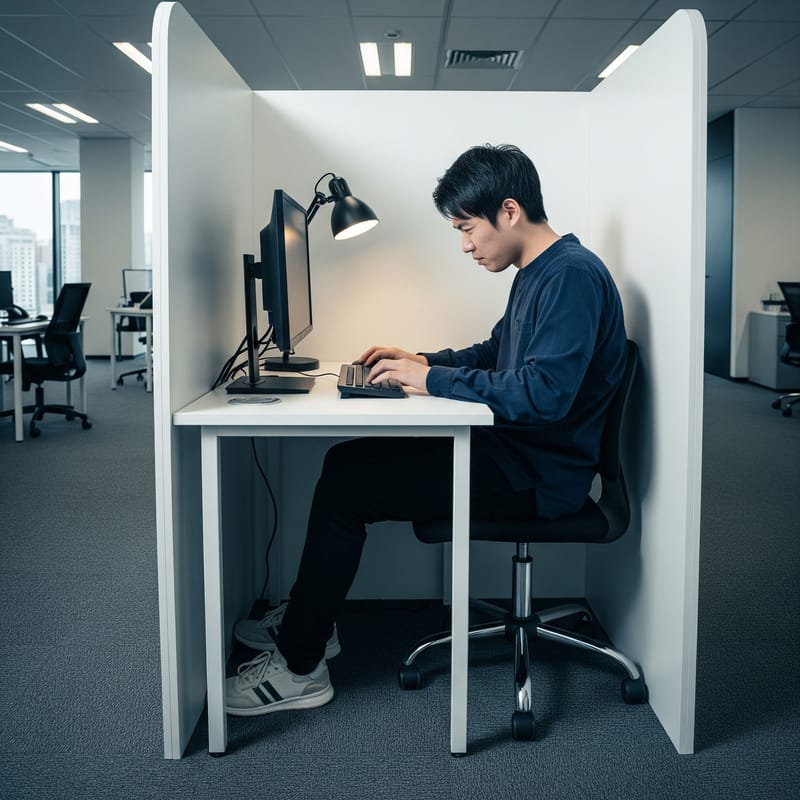The Tyranny of the Tiny Desk: A Concurring Opinion on Ergonomic Absurdity
Why: This scenario directly impacts human well-being and productivity, hitting his pragmatic side hard. A "micro-desk" that causes pain and eye strain is fundamentally counter to the "purpose" of a workspace. The real-world "consequences" of such a design (healthcare costs, decreased output, discomfort) would be obvious to him, leading to a strong, perhaps exasperated, disapproval.
In a bold, if ill-advised, move to maximize office space and foster "hyper-efficiency," the behemoth tech corporation "Squeezeworks Inc." implemented a revolutionary new office design: the "Eco-Pod Micro-Desk." These desks, measuring a mere 18 inches deep by 24 inches wide, were touted as the future of collaborative workspaces, forcing employees to jettison clutter and focus solely on their digital tasks. Complete with built-in, non-adjustable screens and keyboards, the Micro-Desk promised to revolutionize productivity. Instead, it sparked a revolt, culminating in Squeezeworks Employees Union v. Squeezeworks Inc., a case challenging the very notion of a humane workspace, now poised before the Supreme Court.
When Efficiency Crushes Well-being
Breyer's Eye Scream!
Justice Stephen Breyer, renowned for his pragmatic approach that prioritizes the practical consequences and real-world efficacy of policies, would find "The Tyranny of the Tiny Desk" to be a compelling, albeit exasperating, case. His judicial philosophy often seeks to understand if a given regulation or corporate policy actually achieves its stated goal without creating undue burdens or unforeseen negative outcomes. The Micro-Desk policy, designed for "efficiency," would demonstrably fail this test.
Breyer would immediately cut through the corporate jargon of "hyper-efficiency" and "minimalist design" to focus on the human impact. The stated purpose of the Eco-Pod Micro-Desk was to enhance productivity and collaboration. However, the actual consequences would tell a starkly different story:
- Physical Deterioration and Healthcare Costs: The most immediate and obvious consequence of the Micro-Desk would be widespread physical pain. Cramped postures, constant hunched shoulders, wrists bent at unnatural angles, and eyes straining at fixed, too-close screens would inevitably lead to an epidemic of musculoskeletal disorders: carpal tunnel syndrome, chronic back pain, neck strain, and severe eye fatigue. For Breyer, these are not just individual discomforts; they translate into tangible societal costs: increased worker's compensation claims, higher health insurance premiums for employers, and a greater burden on the healthcare system. A policy that demonstrably sickens its workforce is fundamentally impractical and counterproductive, undermining any alleged "efficiency gains."
- Decreased Productivity, Not Increased: While Squeezeworks might argue for focus through minimalism, the reality is that discomfort is a profound distraction. Employees constantly shifting to alleviate pain, taking more frequent breaks to stretch, or even requiring medical appointments, would be demonstrably less productive. Chronic pain and eye strain lead to reduced concentration, increased errors, and a general inability to engage deeply with complex tasks. The "purpose" of increased output would be thoroughly undermined by the "consequence" of a physically debilitated and distracted workforce.
- Erosion of Morale and Employee Turnover: Beyond the physical, the Micro-Desk would inflict significant psychological damage. Employees would feel devalued, treated as mere cogs in a machine, their comfort and well-being sacrificed for a misguided notion of efficiency. This kind of "tyranny" over personal space and ergonomic needs would foster resentment, decrease job satisfaction, and inevitably lead to higher employee turnover. For Breyer, a functioning, productive society relies on a workforce that feels respected and is able to perform its duties effectively. Policies that actively degrade morale and drive away talent are, from a pragmatic standpoint, self-defeating.
- Hindrance to Actual Workflows: Many professions require multiple screens, reference materials, physical documents, or the ability to switch between tasks seamlessly. A tiny, fixed desk makes such basic professional necessities impossible. This isn't just about personal preference; it's about the practical requirements of modern work. Forced digital minimalism would stifle creativity, hinder complex problem-solving, and limit the adaptability required in a dynamic work environment. The "purpose" of a flexible, modern workspace would be thwarted by its rigid, tiny design.
- Regulatory Implications and Legal Precedent: Breyer would also consider the broader regulatory implications. If corporations can impose such ergonomically unsound conditions, what does that mean for worker safety standards? This case could set a dangerous precedent, potentially eroding hard-won labor protections and forcing regulatory bodies like OSHA to constantly play catch-up with corporate "innovations" that prioritize cost-cutting over human well-being. He would likely ponder the judicial role in preventing policies that, while not explicitly violating a specific enumerated right, so clearly undermine the health and practical functioning of the populace.
In the courtroom, Breyer would likely press Squeezeworks's attorneys with pointed, practical questions. "Have you accounted for the rise in workers' compensation claims? What is the demonstrable increase in productivity, accounting for sick days and discomfort? Have you considered the long-term impact on your employees' health and morale? Is the cost-saving from reduced desk size truly offset by the human cost?" He would demand data, not just theoretical projections, to support their claims of efficiency.
Ultimately, "The Tyranny of the Tiny Desk" would be a prime example of a policy that, while perhaps conceived with good intentions (or at least, cost-cutting intentions), utterly fails Breyer's pragmatic test. It creates more problems than it solves, incurs significant hidden costs (healthcare, turnover), and directly harms the individuals it purports to make more "efficient." For Breyer, a policy that actively diminishes human well-being and productivity for a negligible or even negative gain in space utilization is not just bad policy; it is an affront to common sense and the very purpose of a functional society. His concurring opinion would likely highlight the glaring disconnect between the policy's stated aim and its painful, counterproductive reality, asserting that the law, and indeed corporate policy, must always account for the consequences on human lives and livelihoods.
Video created with Gemini Pro for the Eye Scream series, a tribute to Justice Stephen Breyer.






